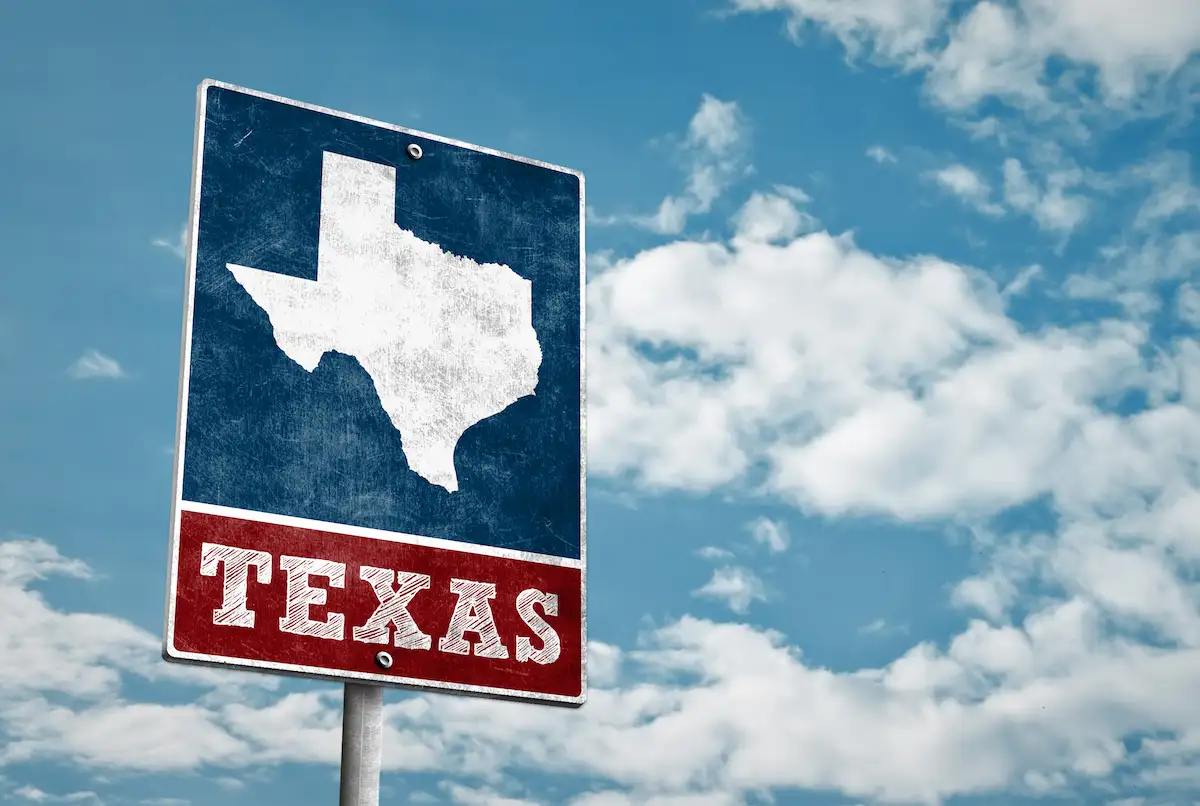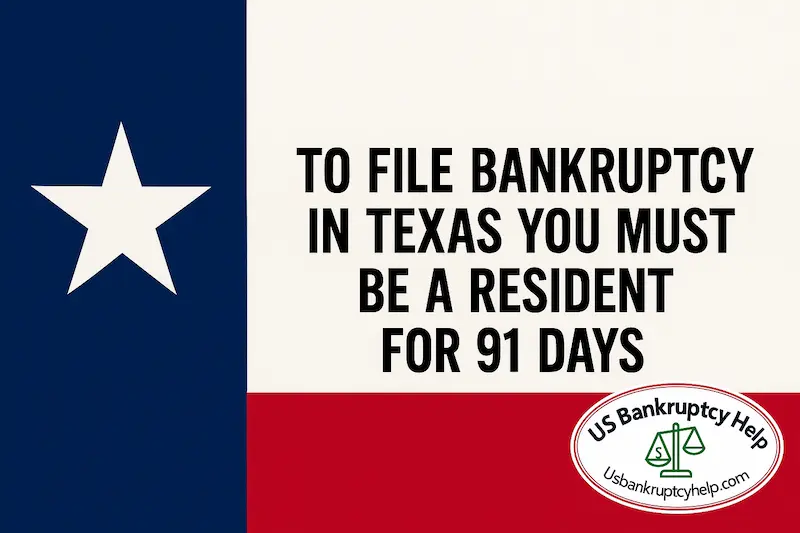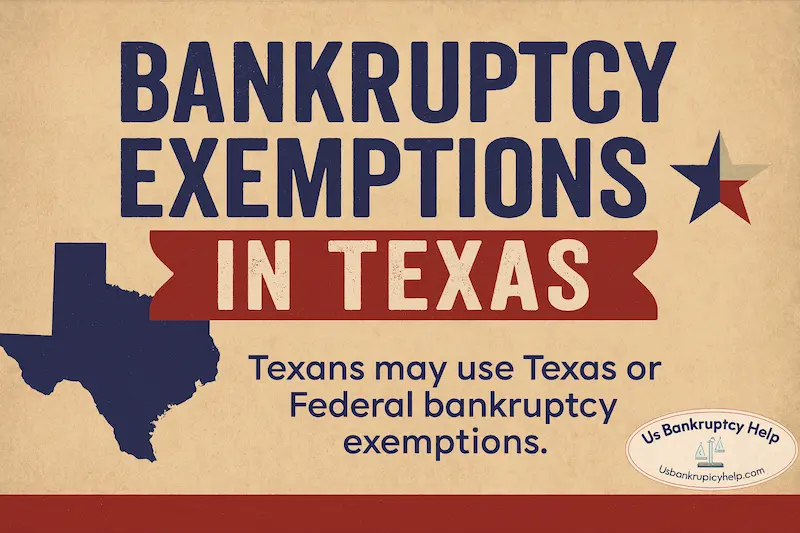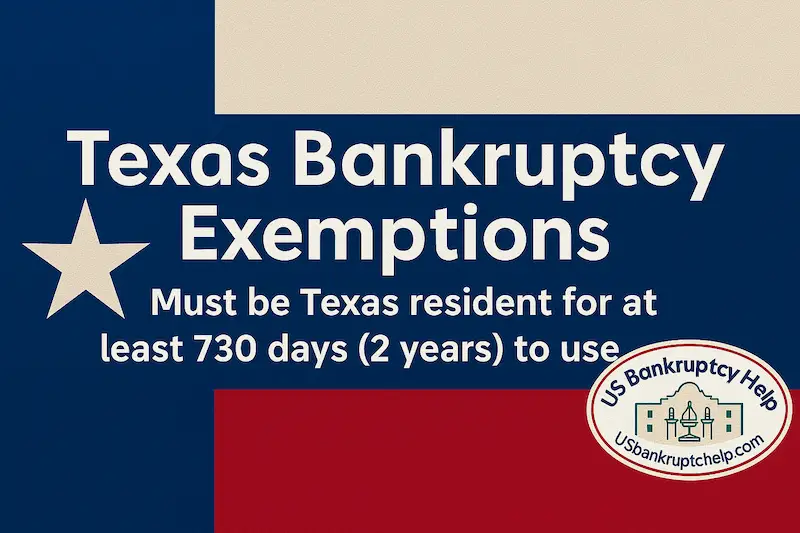
Understanding Bankruptcy Laws in Texas
Navigating bankruptcy laws in Texas can be complex. Understanding these laws is crucial for those facing financial difficulties.
Navigating Bankruptcy in Texas
Bankruptcy in Texas offers a legal path to manage overwhelming debt. It provides relief and a chance for a fresh start.
Texas has specific rules and Texas bankruptcy exemptions that can benefit debtors. Knowing these can help protect assets during the bankruptcy process.
The role of bankruptcy attorneys in Texas is vital. They guide individuals and businesses through the legal maze.
Texas bankruptcy courts handle thousands of cases annually. They ensure the process is fair and just for all parties involved.
This guide will explore the intricacies of bankruptcy laws in Texas. It aims to provide clarity and support for those considering this option.
Overview of Bankruptcy in Texas
Bankruptcy in Texas is governed mainly by federal law but with significant state-specific exemptions. These exemptions can vary between cases and play a crucial role in determining which assets are protected. To be able to file a bankruptcy case in Texas, you must have lived in Texas for at least 91 days prior to filing.

In Texas, there are several bankruptcy options available, tailored to different financial situations. The most common types for individuals include chapter 7 and chapter 13. Both types have unique features and requirements.
Here's a brief overview of the bankruptcy process in Texas:
- Filing a petition in one of the Texas bankruptcy courts
- Listing assets, debts, income, and expenses
- Attending the mandatory 341 Meeting of Creditors
The main goal of bankruptcy is to eliminate debt and provide a fresh start. For many in Texas, it is a strategic decision. Understanding the nuances can aid in making an informed choice.
Types of Bankruptcy Available in Texas
Bankruptcy in Texas offers several avenues for debt relief, each designed to meet different financial needs. The most popular among individuals are chapter 7 and chapter 13. These types cater to varying circumstances and require different approaches.
Chapter 7 Bankruptcy in Texas
Chapter 7 bankruptcy discharges unsecured debts quickly, allowing individuals to get a fresh start. Debtors may exempt their assets under Texas law, which can protect significant portions of their property.
Key benefits include:
- Discharge of unsecured debts like credit cards
- Quick resolution in several months
- Protection under the automatic stay
However, some assets might be sold if they don't meet exemptions. The role of a bankruptcy trustee is significant here, as they oversee asset liquidation and debt repayment. In addition to the Texas focussed guide on chapter 7 above, for another comprehensive overview check out our chapter 7 bankruptcy guide.
Chapter 13 Bankruptcy in Texas
Chapter 13 bankruptcy focuses on reorganizing debts. Rather than liquidate, debtors propose a repayment plan spanning three to five years, based on income and debt level.
Key elements include:
- Repayment plan tailored to income
- Retaining important assets, like homes and vehicles
- Stopping foreclosure proceedings
This chapter also suits those ineligible for chapter 7. Discipline in adhering to the repayment plan is essential for completion. Explore our in-depth chapter 13 guide to learn more about the intricacies of this process.
Other Bankruptcy Chapters (11 & 12)
Business entities often turn to Chapter 11. This allows reorganizing debts while continuing operations. It's complex but suitable for restructuring business finances. Meanwhile, Chapter 12 caters to family farmers and fishermen. It offers specialized protections fitting their unique income patterns.
- Chapter 11: For businesses facing complex debts
- Chapter 12: Tailored for family farmers or fishermen
These chapters address specific financial issues beyond personal bankruptcies. Each has its own procedures and requirements.
Texas Bankruptcy Exemptions

Texas bankruptcy exemptions play a vital role in cases with the state. They allow debtors to retain essential assets while discharging other debts. Texas offers generous exemptions, making it favorable for those filing for bankruptcy. These exemptions can significantly impact the outcome of a bankruptcy case.
Understanding the exemptions you are eligible for is crucial. Texas allows for both federal and state exemptions, giving filers flexibility. However, one must choose between the two without mixing them. Let's explore some key exemptions available in Texas.
- Homestead Exemption: Protects equity in a primary residence.
- Personal Property Exemptions: Safeguard belongings such as furniture and clothing.
- Retirement Accounts: Often fully protected under Texas laws.
These exemptions ensure that individuals can maintain essential assets for a fresh start. Consulting with a bankruptcy attorney can help in deciding the best course.

Homestead Exemption
The homestead exemption is a standout feature in Texas bankruptcy cases. It protects the equity in a primary residence without a specific dollar limit. For urban properties, this applies to up to 10 acres, while rural properties can safeguard up to 100 acres.
This exemption allows Texans to keep their homes, providing stability during financial distress. It’s a key factor for those with significant home equity considering bankruptcy.
Personal Property and Other Exemptions
Texas offers several personal property exemptions to protect essential assets. These exemptions cover a range of items, ensuring that individuals can retain necessary possessions. Here are a few examples:
- Clothing and household goods
- Tools and equipment for work
- Vehicles, under certain conditions
These exemptions provide a safety net, enabling individuals to focus on rebuilding their lives post-bankruptcy. Properly leveraging these can make the process less daunting.
The Bankruptcy Process in Texas
Filing for bankruptcy in Texas involves several essential steps. The process starts with completing a credit counseling course. This is a mandatory step to assess whether bankruptcy is the best solution. Next, you'll need to file a petition in one of Texas's federal bankruptcy courts.
Once you file, an automatic stay is issued, halting most creditor actions. This provides immediate relief from collection attempts. You’ll also need to complete a means test if you are filing for Chapter 7.
The court assigns a bankruptcy trustee to oversee the case. The trustee examines your assets and verifies your filings. Afterwards, a 341 meeting of creditors is scheduled.
- Credit Counseling: Initial mandatory step.
- Petition Filing: Initiates the bankruptcy process.
- Automatic Stay: Stops most collections.
- Trustee Assignment: To manage the case.
- 341 Meeting: Creditors can ask questions.
Concluding the process, your debts may be discharged or restructured based on the chapter filed. Each stage of the process requires attention to detail.
The Means Test
The means test is crucial for determining eligibility for Chapter 7 bankruptcy in Texas. It compares your income against Texas's median income for a similar household size. If you exceed the median, you must further demonstrate limited disposable income. Discover whether you qualify by visiting our comprehensive national means test guide with the latest income limits and eligibility tips.
This test is intended to prevent abuse of Chapter 7 filings. It ensures that only those genuinely unable to repay debts qualify. Accurate completion is important to avoid complications.
The Automatic Stay
The automatic stay is a powerful tool in bankruptcy proceedings. It immediately stops most collection actions once you file for bankruptcy. This includes halting wage garnishments and foreclosure efforts.
The stay provides breathing room to reorganize finances. It acts as a legal barrier between you and your creditors. However, certain actions, like criminal proceedings, may still continue.
The Role of the Bankruptcy Trustee
The bankruptcy trustee plays a vital role in managing your case. Upon filing, the trustee is assigned to oversee proceedings. Their responsibilities include reviewing your assets, income, and documentation.
Trustees aim to ensure the process complies with the law. They may sell non-exempt assets to repay creditors. Their role is crucial for the integrity of the bankruptcy process.
The 341 Meeting of Creditors
The 341 meeting of creditors is a mandatory step in the bankruptcy process. During this meeting, creditors can ask questions about your financial situation. The trustee also attends to verify your information.
This meeting offers an opportunity for creditors to contest or agree with the terms. It’s usually straightforward and brief. Proper preparation ensures a smooth experience without surprises.
Texas Bankruptcy Courts and Filing Locations
In Texas, bankruptcy cases are filed in federal courts. The state is divided into four judicial districts: Northern, Southern, Eastern, and Western. Each district has multiple court locations.
Choosing the right court depends on where you live. You must file your case in the appropriate district. Filing in the wrong district can delay the process.
Below are the districts with some of their main locations:
- Northern District: Dallas, Fort Worth, Lubbock
- Southern District: Houston, Galveston, Brownsville
- Eastern District: Tyler, Sherman, Beaumont
- Western District: Austin, San Antonio, El Paso
If you need help identifying the correct location, a bankruptcy attorney can assist. They guide you through the complexities of filing. Ensure your petition goes to the correct court to avoid unnecessary complications.
Working with Bankruptcy Attorneys in Texas
Hiring a bankruptcy attorney in Texas is often crucial. They offer expertise and personalized advice tailored to your situation. Navigating bankruptcy laws without guidance can be daunting.
An attorney helps you choose between Chapter 7 and Chapter 13. They analyze your financial standing and advise the best route. Their knowledge ensures compliance with state and federal laws.
During the process, they handle all paperwork. This includes filing documents and communication with creditors. Their experience minimizes errors and maximizes your exemptions.
Benefits of working with a bankruptcy attorney include:
- Accurate assessment of your financial condition
- Expertise in state-specific exemptions
- Representation in court proceedings
- Assistance with complex legal documentation
Having professional support can simplify the process. Avoid potential pitfalls, and move forward confidently. Seek an attorney early in your decision-making for the best outcome.
Costs, Fees, and Credit Counseling Requirements
Filing for bankruptcy in Texas involves certain costs and fees. These can vary depending on the bankruptcy chapter filed. It's important to budget for these expenses upfront.
Credit counseling is a mandatory requirement before filing. This session helps evaluate your financial circumstances. It must be completed with a government-approved agency.
Additional costs may include attorney fees and court charges. Having a clear understanding of all potential expenses is essential. Here's a short list of key fees and requirements:
- Filing fees for Chapter 7 or Chapter 13
- Mandatory credit counseling and debtor education courses
- Attorney fees for legal representation
Being prepared for these financial aspects helps streamline the process. Seeking guidance ensures you're meeting all legal prerequisites.
Life After Bankruptcy in Texas
Emerging from bankruptcy in Texas provides a fresh start. This is a chance to rebuild credit and financial stability. However, careful planning is essential to make the most of this opportunity.
Initially, obtaining credit might be challenging. But, by managing finances wisely, improvements can occur over time. It's crucial to adopt responsible spending habits moving forward.
Consider these steps to pave a path to recovery:
- Create a realistic budget to manage expenses.
- Gradually rebuild credit with secured credit cards.
- Maintain an emergency fund to avoid future financial pitfalls.
Focusing on these aspects can lead to long-term financial health. Remember, bankruptcy isn't the end, but a new beginning.
Texas – Bankruptcy FAQs
Where do I file bankruptcy if I live in Texas?
Texas is split into four federal bankruptcy districts: Northern (headquarters in Dallas), Southern (Houston), Eastern (Plano/Tyler/Beaumont), and Western (Austin/San Antonio/El Paso). You must file in the division that covers your county—for example, residents of Austin file in the Western District’s Austin courthouse, while those in Houston use the Southern District’s downtown courthouse.
Does Texas really have an unlimited homestead exemption?
Yes. Texas protects 100 % of the equity in your primary residence, subject only to acreage caps—up to 10 urban acres or100 rural acres for an individual (200 rural acres for a family).
How many vehicles can I keep if I file bankruptcy in Texas?
The state exemption shields the full value of one motor vehicle per licensed household member (or one vehicle for an unlicensed filer who relies on someone else to drive). There is no dollar-value cap on those vehicles.
What other assets can I protect with Texas exemptions?
- Personal property cap: up to $50,000 in aggregate value for a single filer or $100,000 for a family (covers furniture, electronics, clothing, jewelry, firearms, etc.)
- Tools of the trade & livestock: included within the personal-property cap
- Wages: generally 75 % of earned but unpaid wages or 30 × the federal minimum wage, whichever is greater
- Retirement & specified benefits: most IRAs, 401(k)s, life-insurance cash values, Social Security, veterans’ benefits, and workers’ compensation are fully exempt under separate statutes
Texas does not offer a separate wildcard exemption.
How do Texas community-property rules affect bankruptcy if only one spouse files?
Because Texas is a community-property state, most assets and debts acquired during marriage belong to both spouses. When just one spouse files, all community property enters the bankruptcy estate, and the discharge generally protects both spouses from community creditors—even if the non-filing spouse never stepped foot in court.
Can I choose federal exemptions instead of Texas exemptions?
Yes. Texas lets debtors elect either the federal or state exemption scheme. Most homeowners pick the state set for its unlimited homestead, while filers without real estate sometimes opt for the federal list to get its $1,675 + unused-homestead wildcard. You must choose one system or the other—you can’t mix and match.
Do I still have to pass the means test in Texas?
Yes. The federal means test applies nationwide: you compare your last six months of household income to the Texas median for your family size. If you’re above median, you may still qualify for chapter 7 after subtracting allowed expenses; otherwise, chapter 13’s structured repayment plan is usually required.
Explore Bankruptcy Help by State
Browse our state guides to learn exemptions, means test rules, costs, and local procedures. Use these links to jump between states and compare your options.
- Arizona
- California
- Colorado
- Florida
- Georgia
- Illinois
- Indiana
- Maryland
- Michigan
- New York
- Ohio
- Oregon
- Pennsylvania
- Tennessee
- Texas
- Virginia
- Wisconsin